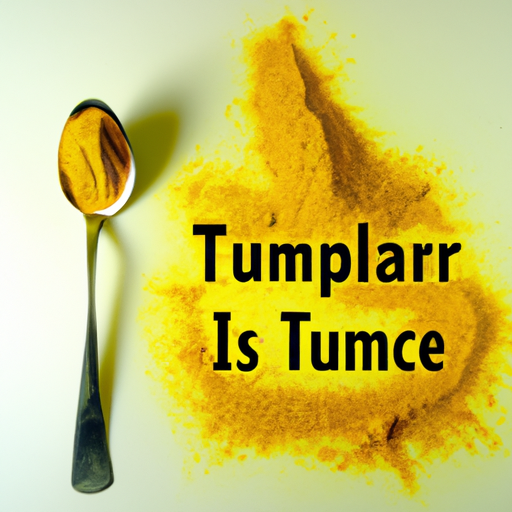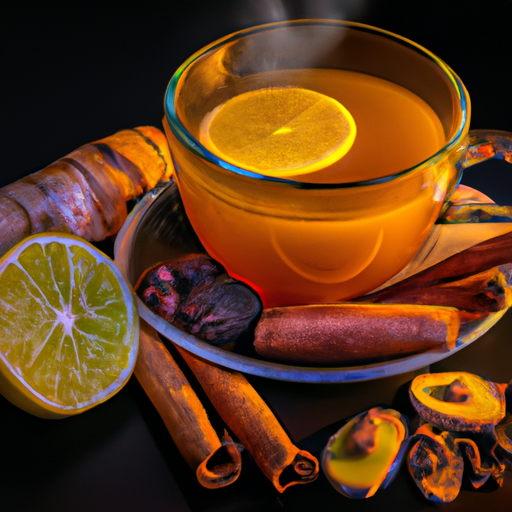If you’re searching for a cozy and soothing drink that is not only tasty but also full of health benefits, turmeric tea is an excellent choice. This tea has become increasingly popular in recent times because of its anti-inflammatory properties and its ability to enhance immunity.
However, one key component that makes turmeric tea so beneficial is curcumin, a potent antioxidant and anti-inflammatory compound found in turmeric.
But how much curcumin is actually in turmeric tea? This is an important question to consider if you’re looking to reap the full health benefits of this beverage. The amount of curcumin in turmeric tea can vary depending on various factors, such as the quality of the turmeric used and how it’s prepared.
In this article, we’ll explore the importance of curcumin in turmeric tea, factors that affect its content, and how to ensure maximum curcumin content in your homemade turmeric tea.
Key Takeaways
- Fresh turmeric root has a higher concentration of curcumin than the powdered form, and using a grater or food processor to finely chop the turmeric root before adding it to boiling water can enhance the curcumin content.
- Curcumin content can be affected by factors such as the quality of the turmeric used and the manufacturing process, and packaged turmeric teas can have as low as 10% of the curcumin found in fresh turmeric.
- Homemade turmeric tea recipes can enhance curcumin absorption, and adding black pepper to turmeric tea can also enhance curcumin absorption.
- It is recommended to start with smaller doses and gradually increase to avoid adverse effects, and seek medical attention if you experience any unusual symptoms after consuming turmeric or curcumin supplements.
What is Curcumin?
What is curcumin?
Curcumin is a compound found in turmeric. It has been studied extensively for its potential health benefits. Curcumin is known to have anti-inflammatory properties, and it is often used as a natural remedy for various ailments, including arthritis, digestive issues, and skin conditions.
However, the benefits of curcumin go beyond just reducing inflammation. Studies have also shown that curcumin may improve brain function and lower the risk of heart disease.
When it comes to curcumin dosage, there is no one-size-fits-all recommendation. The amount of curcumin needed to experience its health benefits can vary based on factors such as age, health status, and the specific condition being treated.
It is recommended to consult with a healthcare professional before starting any new supplement regimen to determine the appropriate dosage for your individual needs.
The health benefits of curcumin are numerous and can be enjoyed by incorporating it into your diet through supplements or by consuming turmeric tea or other turmeric-based dishes.
Health Benefits of Curcumin
You’ll be amazed at how this golden spice can boost your overall well-being and give you a natural glow! Curcumin, the active ingredient in turmeric, has been found to have numerous health benefits.
Here are just a few:
-
Anti-inflammatory properties: Curcumin has been shown to have anti-inflammatory effects, which can help reduce pain and swelling in the body.
-
Antioxidant properties: Curcumin is a powerful antioxidant, which means it can help protect cells from damage caused by free radicals.
-
Potential anticancer effects: Some studies have suggested that curcumin may have anticancer properties, although more research is needed to confirm this.
While you can certainly get some curcumin from turmeric tea, it’s important to note that the amount of curcumin in tea is relatively small. If you’re looking to get more of this beneficial compound, you may want to consider taking curcumin supplements.
In the next section, we’ll discuss the importance of curcumin in turmeric tea.
Importance of Curcumin in Turmeric Tea
When you drink turmeric tea, your body can benefit from the powerful properties of this golden spice. One of the most important components of turmeric is curcumin, a potent antioxidant and anti-inflammatory compound. However, curcumin has low bioavailability on its own, meaning that your body may not absorb it efficiently. Luckily, when you consume turmeric in tea form, curcumin absorption is enhanced due to the presence of other compounds that aid in its absorption.
In addition to its health benefits, curcumin also adds a unique flavor profile to turmeric tea. The compound is responsible for the spicy, slightly bitter taste of the tea, and many people find it to be a refreshing change from traditional teas. So not only does turmeric tea offer a host of health benefits, but it also provides a delicious and satisfying beverage option.
However, the amount of curcumin in turmeric tea can vary depending on various factors, which we’ll explore in the next section.
Factors that Affect Curcumin Content in Turmeric Tea
When making turmeric tea, there are several factors that can affect the curcumin content. To ensure that you get the most out of your tea, it’s important to pay attention to the quality of the turmeric used, the preparation method, and the amount of turmeric used. By considering these factors, you can increase the amount of curcumin in your turmeric tea and reap the benefits of this powerful antioxidant.
Quality of Turmeric Used
If you’re using top-notch turmeric, then your turmeric tea will be bursting with the rich aroma and flavor of the spice, transporting you to a bustling Indian market. The quality of the turmeric used in preparing the tea determines the amount of curcumin present in the final product.
Turmeric sourcing is therefore crucial, and it’s recommended that you use organic turmeric as opposed to non-organic. Organic turmeric is free from pesticides and other harmful chemicals that could compromise the quality of the tea. Non-organic turmeric, on the other hand, may contain contaminants that can affect the quality of the tea and the amount of curcumin present.
In addition to organic turmeric, ethical farming practices and fair trade certifications are also important factors to consider when sourcing turmeric for your tea. Ethical farming practices ensure that the turmeric is grown sustainably and that the farmers are treated fairly. Fair trade certifications guarantee that the farmers are paid fair wages for their labor, and this helps to support their livelihoods.
By using top-quality turmeric, you ensure that your turmeric tea is not only bursting with flavor but also rich in curcumin. Now, let’s move on to the next section, where we’ll discuss the preparation method for making the perfect turmeric tea.
Preparation Method
To achieve the full potential of the aromatic and flavorful turmeric, it’s essential to follow the proper preparation method for brewing a perfect cup of tea. When it comes to turmeric tea brewing, the best way to extract the maximum amount of curcumin is by using freshly grated turmeric.
This is because, during the preparation process, the natural oils and flavor compounds of the turmeric are released, enhancing the overall taste and aroma of the tea.
To make the perfect cup of turmeric tea, start by heating water in a pot and then add freshly grated turmeric to it. Allow the mixture to simmer for about 10 minutes, ensuring that the heat is low to prevent burning. Afterward, strain the mixture into a cup and add black pepper or ginger to improve the bioavailability of curcumin in the tea.
The recommended turmeric dosage for a cup of tea is about 1-2 teaspoons of grated turmeric per cup of water. By following this preparation method, you can be sure that you’re getting the maximum benefits of curcumin in turmeric tea.
Moving on to the next section, let’s discuss the amount of turmeric used to make the tea.
Amount of Turmeric Used
Interestingly enough, the recommended dosage for a cup of this flavorful beverage is about 1-2 teaspoons of grated turmeric per cup of water. This amount provides a good balance between taste and health benefits.
Drinking turmeric tea regularly can help you reap the benefits of antioxidants, anti-inflammatory properties, and improve digestion.
To ensure maximum curcumin content in turmeric tea, it’s important to use fresh, high-quality turmeric and to brew it correctly. One effective brewing technique involves boiling water and then adding the grated turmeric to the hot water, allowing it to steep for 10-15 minutes.
Straining the mixture after steeping will remove any larger pieces of turmeric and provide a smooth, flavorful tea.
How to Ensure Maximum Curcumin Content in Turmeric Tea
One way you can guarantee the highest curcumin content in your turmeric tea is by using fresh turmeric root instead of powdered turmeric. Fresh turmeric root has a higher concentration of curcumin than the powdered form, which can lose its potency during processing.
When making your tea with fresh turmeric root, you can follow these tips to ensure maximum curcumin content:
- Choose high-quality, organic turmeric root to avoid pesticides and other harmful chemicals.
- Use a grater or food processor to finely chop the turmeric root before adding it to boiling water.
- Let the turmeric root steep in boiling water for at least 10 minutes to release its curcumin content.
- Add black pepper or ginger to your turmeric tea to enhance the absorption of curcumin in your body.
Turmeric tea benefits are numerous, including its anti-inflammatory and antioxidant properties, and can be consumed at any time of the day. Just make sure to use fresh turmeric root for maximum curcumin content and to follow the tips provided above.
In the next section, we’ll discuss curcumin content in packaged turmeric tea.
Curcumin Content in Packaged Turmeric Tea
As you venture into the world of packaged turmeric teas, your taste buds may ride a rollercoaster of flavors and emotions akin to a theme park adventure. But when it comes to curcumin content, the ride may not be as thrilling. Packaged turmeric teas vary greatly in their curcumin content, due to factors such as the quality of the turmeric used and the manufacturing process. In fact, some studies have found that the curcumin content in packaged turmeric teas can be as low as 10% of the amount found in fresh turmeric.
To help you navigate the world of packaged turmeric teas, here is a table comparing the curcumin content in some popular brands:
| Brand | Curcumin Content (mg/serving) |
|---|---|
| Traditional Medicinals | 20-40 |
| Yogi | 45-90 |
| Rishi | 40-80 |
| Numi | 10-20 |
It’s important to note that the curcumin content can also be affected by shelf life and storage conditions. To ensure maximum curcumin content, look for teas that are freshly packaged and store them in a cool, dry place. If you want to increase the curcumin content even further, consider making your own turmeric tea using fresh turmeric root.
As you move on to the next section about DIY turmeric tea recipes for maximum curcumin content, keep in mind that making your own tea can be a fun and delicious way to increase your curcumin intake.
DIY Turmeric Tea Recipes for Maximum Curcumin Content
For those seeking to maximize the potential health benefits of their daily beverage, crafting homemade turmeric-infused blends can be a worthwhile endeavor. There are numerous variations of turmeric tea recipes available online, but the key is to ensure that the curcumin content is enhanced for maximum absorption.
One popular recipe involves simmering turmeric root in water for at least 15 minutes, adding other spices such as ginger or cinnamon for flavor, and then straining the mixture before serving. Another option is to use turmeric powder instead of fresh root, which can be mixed with hot water, honey, and lemon juice for a refreshing and nutrient-dense drink.
While the curcumin content in homemade turmeric tea will vary depending on the recipe and ingredients used, the benefit of making your own blend is the ability to control the quality and quantity of the turmeric. Additionally, pairing turmeric with black pepper has been shown to enhance curcumin absorption, so adding a pinch of pepper to your tea can also be beneficial.
With these tips in mind, crafting your own turmeric tea can be a delicious and healthy addition to your routine.
Transitioning into the subsequent section, there are also other ways to incorporate curcumin into your diet beyond just drinking turmeric tea.
Other Ways to Incorporate Curcumin into Your Diet
Now that you’ve learned some DIY turmeric tea recipes for maximum curcumin content, you may be wondering if there are other ways to incorporate this powerful antioxidant into your diet. The good news is that there are plenty of options available to you.
One easy way to incorporate curcumin into your diet is to add it to your smoothies. Here are three smoothie recipes that incorporate turmeric:
-
Mango Turmeric Smoothie: Blend together mango, banana, coconut milk, turmeric, and a pinch of black pepper for a delicious and nutritious smoothie.
-
Golden Milk Smoothie: Combine almond milk, frozen banana, turmeric, cinnamon, ginger, and a touch of honey for a warming and satisfying drink.
-
Tropical Turmeric Smoothie: Blend together pineapple, mango, coconut milk, turmeric, and a squeeze of lime juice for a refreshing and tropical twist.
Another way to incorporate curcumin into your diet is by cooking with turmeric. Here are three recipe ideas:
-
Turmeric Rice: Add turmeric to your rice for a vibrant yellow color and added health benefits.
-
Turmeric Roasted Vegetables: Toss your favorite vegetables with olive oil, turmeric, and a sprinkle of salt for a delicious and nutritious side dish.
-
Turmeric Chicken: Marinate chicken in a mixture of turmeric, lemon juice, and garlic for a flavorful and healthy main dish.
Incorporating curcumin into your diet can be easy and delicious. However, it’s important to note that there are some precautions and possible side effects to be aware of.
Precautions and Possible Side Effects
Be aware of precautions and possible side effects when incorporating curcumin into your diet. While turmeric and curcumin are generally safe, they may interact with certain medications and health conditions. For example, curcumin can thin the blood, so if you are taking blood-thinning medications such as warfarin or aspirin, it is important to talk to your doctor before consuming large amounts of turmeric or taking curcumin supplements.
In addition, high doses of curcumin may cause gastrointestinal issues such as nausea, diarrhea, and stomach upset. It is recommended to start with smaller doses and gradually increase to avoid any adverse effects. If you experience any unusual symptoms after consuming turmeric or curcumin supplements, stop using them and seek medical attention. Overall, incorporating curcumin into your diet can have many health benefits, but it is important to be aware of precautions and possible interactions with medications or health conditions.
| Precautions | Interactions | ||
|---|---|---|---|
| May thin blood | May interact with blood-thinning medications | ||
| May cause gastrointestinal issues | May interact with chemotherapy drugs | ||
| May cause allergic reactions | May interact with diabetes medications | May interact with medications for high blood pressure |
Frequently Asked Questions
Can curcumin be extracted from turmeric and used for medicinal purposes without consuming turmeric tea?
Yes, curcumin can be extracted from turmeric and used for medicinal purposes without consuming turmeric tea. Turmeric supplements are available that contain concentrated curcumin levels, making it easier to get the desired health benefits. Extracting curcumin involves specialized methods and equipment.
Is it safe to consume large amounts of curcumin and turmeric tea on a daily basis?
Did you know that turmeric has been used for centuries in Ayurvedic medicine? While turmeric tea is generally safe in moderation, excessive daily intake of curcumin may lead to potential risks. Benefits and dosage recommendations vary and should be discussed with a healthcare professional.
What are some common recipes for using turmeric and curcumin in cooking besides turmeric tea?
Looking to add turmeric and curcumin to your cooking? Try making a turmeric paste for stir-fries or adding turmeric to rice dishes. Incorporate curcumin into marinades and sauces for added flavor and health benefits.
Are there any specific medical conditions or medications that interact negatively with curcumin consumption?
Negative interactions and health risks may occur when consuming curcumin with certain medications or medical conditions, such as blood thinners and gallbladder issues. Consult with a healthcare professional before consuming curcumin supplements or adding it to your diet.
How does the quality and source of the turmeric used in turmeric tea affect the curcumin content?
The quality and source of turmeric used in turmeric tea can affect the curcumin potency. Turmeric sources from India and Curcuma longa species have the highest curcumin content.
Conclusion
Congratulations on learning about the benefits of curcumin in turmeric tea! By now, you may be wondering if it’s worth the effort to ensure maximum curcumin content in your tea. One common objection is that it may take more time and effort to prepare fresh turmeric tea or carefully select packaged tea with high curcumin content. However, the potential health benefits of curcumin make it worth the extra effort.
Curcumin has been shown to have anti-inflammatory and antioxidant properties, which can improve brain function, reduce the risk of chronic diseases, and even potentially prevent cancer. By incorporating turmeric tea into your daily routine, you can reap these benefits and improve your overall health.
Remember to consider the factors that affect curcumin content in turmeric tea and follow the tips provided in this article to ensure maximum curcumin content. Whether you choose to make your own tea or purchase packaged tea, be aware of the curcumin content and choose the best option for your needs.
By making this small change in your diet, you can enjoy the health benefits of curcumin and improve your quality of life.










